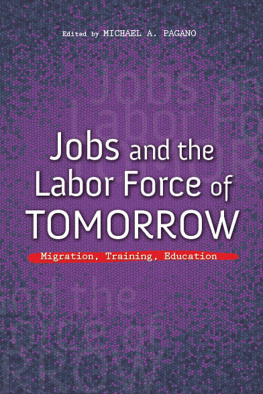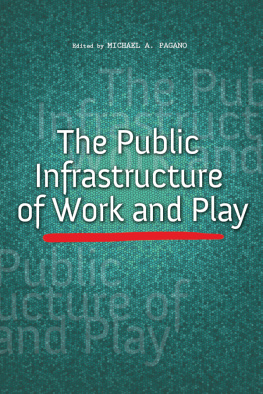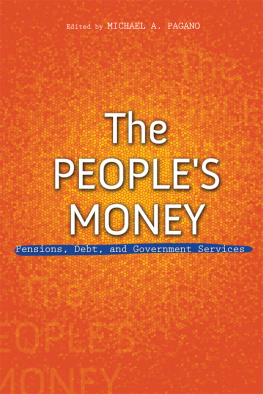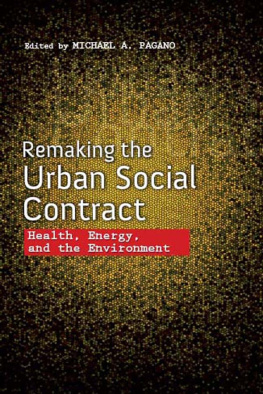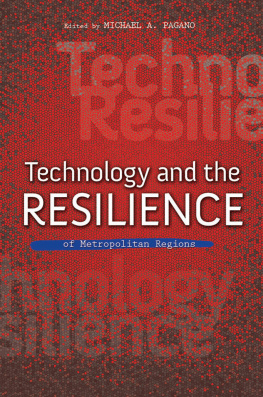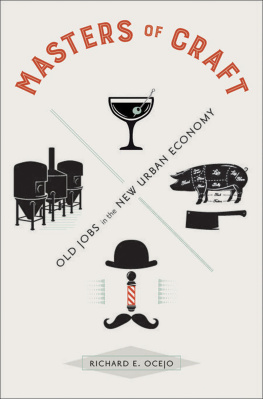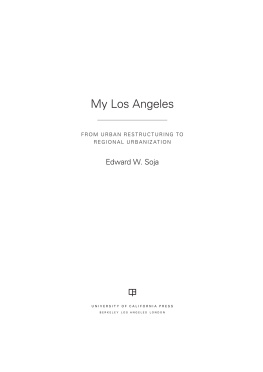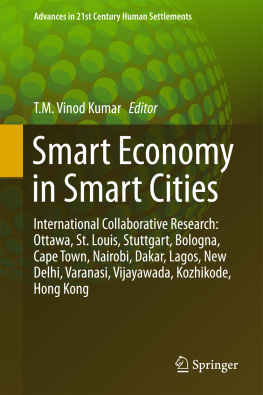Jobs and the Labor Force of Tomorrow
Migration, Training, Education
EDITED BY MICHAEL A. PAGANO
University of Illinois at Chicago
PUBLISHED FOR THE
COLLEGE OF URBAN PLANNING
AND PUBLIC AFFAIRS (CUPPA),
UNIVERSITY OF ILLINOIS AT CHICAGO,
BY THE UNIVERSITY OF ILLINOIS PRESS
Urbana, Chicago, and Springfield
Preface and Acknowledgments
The year of the 2016 presidential election engaged the nation in an animated conversation about jobs, immigration, and trade, or in the lexicon of academia, human capital. Dynamic metropolitan economies require a diverse, trained, and available workforce that adapts to the needs of commerce, industry, government, and the service sector today as well as in the future. The rapidly changing economy demands that the workforce be adaptable and flexible by continuously increasingly skill levels, providing training opportunities, and recognizing the quick pace of job shifting. The quality of the workforce and supply of human capital in U.S. urban areas have been shaped by a variety of forces throughout the industrial and postindustrial eras, most notably the enactment of compulsory public education, inducement of internal migration, massive demands for a rapidly increasing workforce via immigration, and the enactment of public-policy regulations concerning wages, working conditions, and collective bargaining. The 2016 Urban Forum focused its lens on human capital development to address the contemporary challenges that shape human capital in metropolitan regions by examining the role of migration and immigration, K12 education preparedness, postsecondary workforce training and development efforts, and recruitment and professional development of Millennials.
The 2016 event was cochaired by Cook County Board president Toni Preckwinkle; Juan Salgado, who is president of the Instituto del Progreso Latino; and UIC Chancellor Michael Amiridis. The event was held on September 15, attracting five hundred students, community activists, private citizens, government and nonprofit leaders, and many others. The keynote address was presented by award-winning columnist Clarence Page. A senior member of the Chicago Tribune editorial board and a regular panelist on The McLaughlin Group, Page also serves as a guest panelist on CBS's Face the Nation. He is a regular contributor of essays to PBS News Hour, has hosted documentaries on the Public Broadcasting System, and is the 1989 Pulitzer Prize winner for Commentary.
The 2016 UIC Urban Forum's external board of advisors includes the following:
- Clarence Anthony, executive director, National League of Cities
- MarySue Barrett, president, Metropolitan Planning Council
- Henry Cisneros, former secretary, HUD; former mayor, San Antonio; founder and chairman, CityView
- Rahm Emanuel, mayor, Chicago
- Lee Fisher, president and CEO, CEOs for Cities
- Karen Freeman-Wilson, mayor, Gary
- Bruce Katz, Centennial Scholar, Brookings Institution
- Jeff Malehorn, president and CEO, World Business Chicago
- Terry Mazany, president and CEO, Chicago Community Trust
- Toni Preckwinkle, president, Cook County Board
- Julia Stasch, president, John D. and Catherine T. MacArthur Foundation
- Joseph Szabo, executive director, Chicago Metropolitan Agency for Planning
- Susana Vasquez, vice president for Strategic Initiatives and Resource Development, Illinois Facilities Fund
Three panels were formed to discuss the broad range of human capital issues. The first was titled Evolving Pathways to Work, and sitting on the panel were
- James Heckman, Nobel Prize economist, professor, University of Chicago
- Theresa E. Mintle, president and CEO, Chicagoland Chamber of Commerce
- Juan Salgado, president and CEO, Instituto del Progreso Latino
John McCarron, columnist and former editorial board member of the Chicago Tribune, moderated the panel.
The second panel, The Jobless Economy, included
- George Crabtree, director, UIC Energy Initiative; Distinguished Professor of Physics, UIC; director of the Joint Center for Energy Storage (JCESR) at Argonne National Laboratory
- Beth Swanson, vice president of Strategy and Programs, Joyce Foundation
- Julie Friedman Steele, founder and CEO, 3D Printer Experience; board of directors and interim executive director, World Future Society
The panel was moderated by Sarah Karp, reporter, WBEZ.
The last panel of the day focused on issues of immigration and migration. The panelists on Bridges or Walls? Immigration and Trade Policy included
- Oscar Chacn, cofounder and executive director, Alianza Americas
- Pin Ni, president, Wanxiang America
- Hctor R. Cordero-Guzmn, professor, School of Public and International Affairs, Baruch College, City University of New York
Chip Mitchell, West Side Bureau reporter, WBEZ, moderated the panel.
A concluding keynote address on the inclusive economy was presented by Terry Mazany, president and CEO of the Chicago Community Trust.
The presidential election and the continuing controversy and conversation surrounding jobs, immigration, the jobless economy, international trade and the like, demonstrated the critical importance of discussing these human capital issues in a public, open, and interactive setting. An undertaking of this magnitude requires an investment of time and resources on the part of an outstanding group of dedicated employees who invested untold hours in planning, designing, and managing the event. In particular, I am indebted to the outstanding conference management skills of Jenny Sweeney and Elle Ullum, who orchestrated the event with the generous support of Jasculca-Terman Associates, especially Karla Bailey. Other UIC personnel who were active and supportive of the various tasks and activities of the process include Jennifer Woodard, Darcy Evon, Norma Ramos, and Bill Burton. The graduate assistants who worked on this project were Rudy Faust and Jantel Hines. I am deeply grateful to the entire team for their superb job in creating the event and for their indomitable spirit of working together for another successful event.
The editorial assistance and manuscript supervision by Rudy Faust, who was responsible for writing the summary of the panelists conversations ( of this book, which synthesizes panelists salient comments) and who was responsible for the book production process, is owed a deep debt of gratitude.
The annual UIC Urban Forum offers thought-provoking, engaged, and insightful conferences on critical urban issues in a venue to which all of the world's citizens are invited.
Michael A. Pagano
Director of the UIC Urban Forum and Dean, College of Urban Planning and Public Affairs, University of Illinois at Chicago
January 2017

